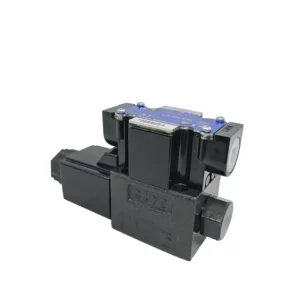A hydraulic valve is a component of a hydraulic system that controls the flow and pressure of hydraulic fluid. It is designed to open and close in response to changes in pressure or other input signals, and to direct the flow of hydraulic fluid to different parts of the hydraulic system.
There are several types of hydraulic valves, including:
Directional control valves: These valves control the direction of fluid flow in a hydraulic system and are used to control the movement of hydraulic cylinders or motors.
Pressure control valves: These valves regulate the pressure of hydraulic fluid in a system and are used to prevent overloading or damage to the system.
Flow control valves: These valves regulate the flow rate of hydraulic fluid in a system and are used to control the speed of hydraulic actuators or motors.
Check valves: These valves allow fluid to flow in one direction only and are used to prevent backflow or fluid leakage in a hydraulic system.
Relief valves: These valves are designed to release excess pressure in a hydraulic system and are used to protect the system from damage due to overpressure.
Proper maintenance of hydraulic valves is essential to ensure safe and reliable operation of the hydraulic system. Regular inspection and maintenance of the hydraulic system, including the valves, hoses, and fittings, can help prevent wear and tear and address any issues promptly.
During the inspection, a qualified mechanic will check the valves for any signs of wear, damage, or leaks, and will also check the fluid level and quality.They will also check the hydraulic system for any signs of contamination or overheating.
To prevent issues with hydraulic valves, it is important to follow the manufacturer’s recommendations for use and maintenance, including using the right type and quality of hydraulic fluid, avoiding overloading or exceeding the weight capacity of the hydraulic system, and inspecting the hydraulic system regularly for signs of wear, damage, or leaks.
Additionally, it is recommended to use safety equipment, such as safety stands or chocks, to prevent injury or damage in the event of an accident, and to follow proper operating procedures to avoid unnecessary wear and tear on the hydraulic valves and other components.
If you suspect that your hydraulic valves are not functioning properly, it is recommended to have them inspected and repaired by a qualified mechanic to ensure safe and reliable operation. hydraulic valve manufacturers It is important to address any issues with the hydraulic system promptly, as they can affect the performance and safety of your equipment and lead to more expensive repairs down the line.
Proper use and maintenance of hydraulic valves and systems can help ensure safe and reliable operation, as well as extend the lifespan of the equipment. It is recommended to consult a qualified mechanic or technician for assistance with installation, repair, or maintenance of hydraulic valves and systems, and to address any issues promptly to avoid more expensive repairs down the line.
There are several common causes of hydraulic valve failure, including:
Contamination: Contamination of hydraulic fluid with dirt, debris, or other foreign material is a common cause of valve failure. Contaminants can cause valve components to wear or become damaged, or can cause the valve to become stuck or unable to move properly.
Wear and tear: Wear and tear on valve components due to high pressure, frequent use, or other factors can cause the valve to fail over time. Components such as seals, O-rings, and springs can wear out or become damaged, leading to leaks or other issues.
Overloading: Overloading or exceeding the weight capacity of the hydraulic system can cause excessive pressure on the valve and its components, leading to failure.
Improper installation: Improper installation of the valve, such as incorrect alignment or torque, can cause the valve to fail prematurely.
Corrosion: Corrosion of valve components due to exposure to moisture or other environmental factors can cause the valve to fail.
Electrical or electronic issues: Hydraulic valves that rely on electrical or electronic controls can fail due to issues with wiring, sensors, or other electronic components.
Poor maintenance: Lack of regular maintenance, such as failure to replace worn components or to change the hydraulic fluid as recommended, can cause the valve to fail prematurely.
Proper use and maintenance of hydraulic valves is essential to prevent valve failure and ensure safe and reliable operation of the hydraulic system.Regular inspection and maintenance of the hydraulic system, including the valves, hoses, and fittings, can help prevent wear and tear and address any issues promptly. It is important to follow the manufacturer’s recommendations for use and maintenance, including using the right type and quality of hydraulic fluid, avoiding overloading or exceeding the weight capacity of the hydraulic system, and inspecting the hydraulic system regularly for signs of wear, damage, or leaks.
Additionally, it is recommended to use safety equipment, such as safety stands or chocks, to prevent injury or damage in the event of an accident, and to follow proper operating procedures to avoid unnecessary wear and tear on the hydraulic valves and other components.
If you suspect that your hydraulic valves are not functioning properly, it is recommended to have them inspected and repaired by a qualified mechanic to ensure safe and reliable operation. It is important to address any issues with the hydraulic system promptly, as they can affect the performance and safety of your equipment and lead to more expensive repairs down the line.
Proper use and maintenance of hydraulic valves and systems can help ensure safe and reliable operation, as well as extend the lifespan of the equipment. It is recommended to consult a qualified mechanic or technician for assistance with installation, repair, or maintenance of hydraulic valves and systems, and to address any issues promptly to avoid more expensive repairs down the line.
